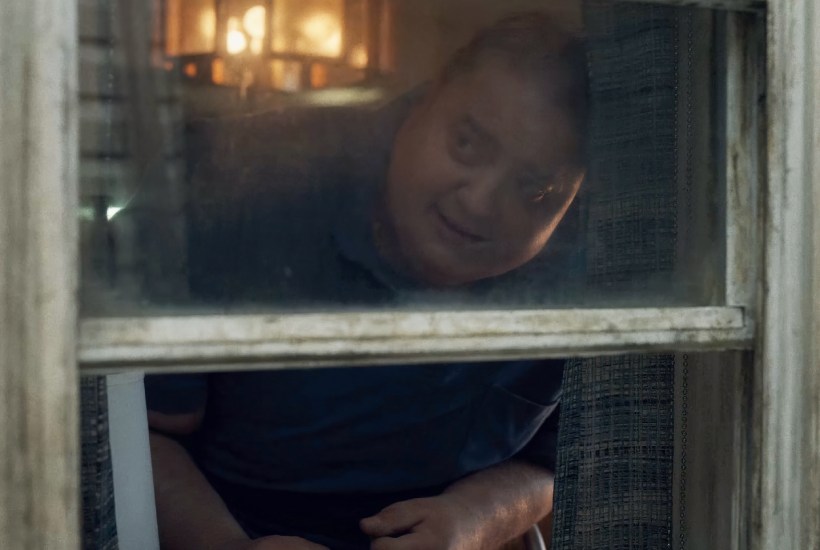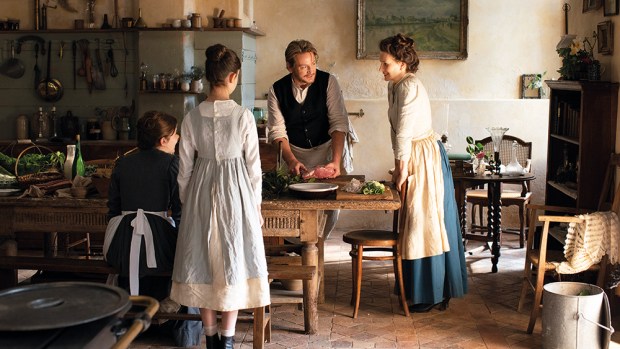I can’t work out if Darren Aronofsky’s The Whale, which stars Brendan Fraser as a man weighing 600lb – that’s 42 stone in real money – is ‘abhorrently cruel’, as some have said, or a film of ‘rare compassion’, as others have said. Either way, it is compelling, although whether that’s for the right reasons or wrong reasons, I also can’t work out. You certainly can’t take your eyes off Fraser, much as you’d sometimes wish to. Is this really sweet, klutzy ‘George, George, George of the Jungle (watch out for the tree!)’? After years in the wilderness, Fraser has now been nominated for an Oscar. So what we can agree on is that Aronofsky has done for him what, for example, Tarantino did for John Travolta.
Samuel D. Hunter adapted the script from his own play, and even if you didn’t know this, you’d work it out, as virtually every scene cries: ‘This was a play!’ Aronofsky is uninterested in the camera taking up more of the burden of storytelling. The characters are essentially boxed into the one room in Charlie’s crappy apartment. Charlie teaches English online and pretends his laptop camera is broken as he does not want his students to see him in the flesh. There is a lot of flesh. Charlie (Fraser, in prosthetics) is essentially constrained to the one chair as he can barely walk.
Hunter has said that he wants us to look beyond Charlie’s appearance to see ‘the deep, complex humanity of this very beautiful human being’. But if that is so, why does Aronofsky focus so relentlessly on the physical in a way that seems to invite revulsion? Why show Charlie naked in the shower? Why show him binge-eating until he vomits? One of our first views of Charlie involves him masturbating to porn and having a heart attack. On this occasion I wasn’t looking at the inside man; I was looking at my lap while repeating to myself: ‘Please God, make it stop.’
But back to the narrative, such as it is. Charlie, we quickly learn, has congestive heart failure, has only a week to live, and is eating himself to death. (I know! Cheery!) Other characters truck up at various times. There’s his friend Liz (Hong Chau), a nurse, his fury-filled teenage daughter Ellie (Sadie Sink), his alcoholic ex-wife Mary (Samantha Morton), and a passing evangelical missionary Thomas (Ty Simpkins). Eight years earlier, we learn, Charlie left his wife and daughter for a male student who was Liz’s brother and a member of Thomas’s church and has since died. Charlie is guilt-ridden, apologetic, and is seeking redemption, particularly from Ellie, whom he abandoned, which turned her into the horror she is.
Charlie is presented as a man who has no other options other than the one he is presently taking, but I kept thinking: if he loves Ellie so much couldn’t he, when it was still possible, have chosen the path that might have enabled him to live and get to know her? You will feel some compassion but it’ll only take you so far.
The film touches variously on parental responsibility, sexuality, religious homophobia, suicide, Moby-Dick, Walt Whitman’s ‘Song of Myself’. But, ultimately, it alludes to things without adding up to much of anything. Still, the performances are all excellent, and Fraser is especially compelling, bringing a sincerity to Charlie, and an openness and gentleness. Someone asked me if it’s worth seeing and I said: ‘Yes but also no.’ I hope that clears it up.
Got something to add? Join the discussion and comment below.
Get 10 issues for just $10
Subscribe to The Spectator Australia today for the next 10 magazine issues, plus full online access, for just $10.
You might disagree with half of it, but you’ll enjoy reading all of it. Try your first month for free, then just $2 a week for the remainder of your first year.














Comments
Don't miss out
Join the conversation with other Spectator Australia readers. Subscribe to leave a comment.
SUBSCRIBEAlready a subscriber? Log in